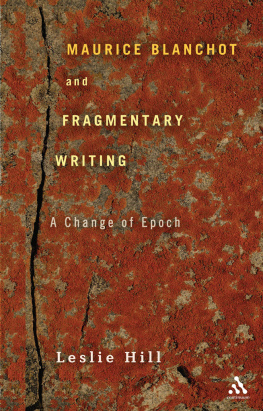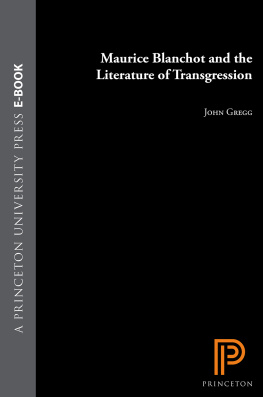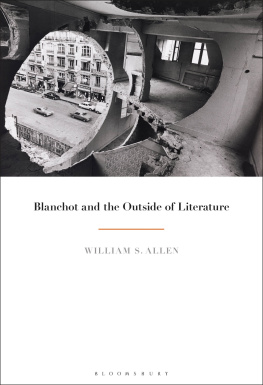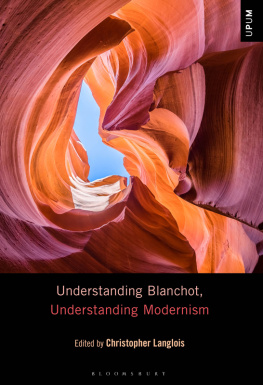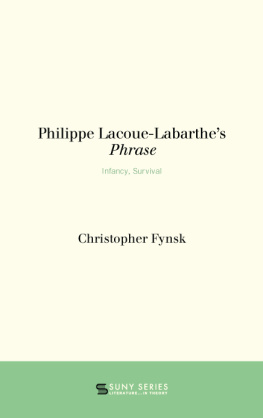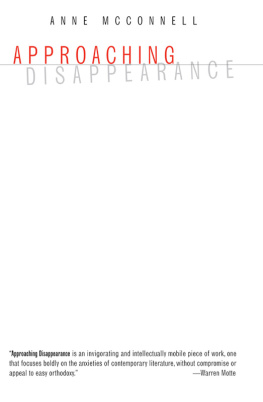ENDING AND UNENDING AGONY
On Maurice Blanchot
Philippe Lacoue-Labarthe
translated by Hannes Opelz
Fordham University Press
New York 2015
Copyright 2015 Fordham University Press
This book was originally published in French as Philippe Lacoue-Labarthe, Agonie termine, agonie interminable sur Maurice Blanchot: Suivi de Lmoi Editions Galile, 2011.
This work has been published with the assistance of the French Ministry of CultureNational Center for the Book.
Ouvrage publi avec le concours du Ministre franais charg de la cultureCentre National du Livre.
All rights reserved. No part of this publication may be reproduced, stored in a retrieval system, or transmitted in any form or by any meanselectronic, mechanical, photocopy, recording, or any otherexcept for brief quotations in printed reviews, without the prior permission of the publisher.
Fordham University Press has no responsibility for the persistence or accuracy of URLs for external or third-party Internet websites referred to in this publication and does not guarantee that any content on such websites is, or will remain, accurate or appropriate.
Fordham University Press also publishes its books in a variety of electronic formats. Some content that appears in print may not be available in electronic books.
Visit us online at www.fordhampress.com.
Library of Congress Control Number: 2015942655
Printed in the United States of America
17 16 15 5 4 3 2 1
First edition
Contents
Aristide Bianchi and Leonid Kharlamov
Translators Note
The present volume is a translation of Philippe Lacoue-Labarthes Agonie termine, agonie interminable. Sur Maurice Blanchot (Paris: Galile, 2011), published posthumously and edited by Aristide Bianchi and Leonid Kharlamov. With the exception of [In 1976, Malraux...] and Interview with Pascal Possoz, that French edition is thus the source text for the present translation. (Full bibliographical details on all texts translated here are provided in the Bibliographical Note at the end of this volume.) The present volume also includes a translation of the Prsentation (here, the Introduction) by the editors of the original French text, which offers a thorough overview of the books complicated genesis and introduces readers to the aesthetic, political, and ethical stakes of its engagement with its subject, Maurice Blanchot, quoting at length from a wide selection of previously unpublished material (conference papers, seminar notes, correspondence, radio broadcasts, etc.) drawn from the Philippe Lacoue-Labarthe archives at the Institut Mmoires de ldition contemporaine (IMEC).
As indicated above, two texts translated for this volume do not appear in the French edition. The first, left untitled by its author (and retitled for the present translation), is a response to a survey on intellectuals carried out by the French journal Lignes and was originally published in October 1997 under the title (supplied by the journal) Les intellectuels. Tentative de dfinition par eux-mmes, enqute (Intellectuals: An Attempt at Self-DefinitionA Survey). Considering the central role played by Blanchot in this text, it seemed only fitting to include it here, all the more so because it brings into sharp focus the ethico-political dimension of Lacoue-Labarthes engagement with Blanchot, which, while decisively at stake in other texts featured in the present volume, never enjoys the kind of direct attention it receives in the text in question.
The second text not appearing in the French edition is a two-part interview conducted by gastroenterologist Pascal Possoz in December 2001 and January 2002. At the time of the interview, Possoz was working on a doctoral dissertation in psychopathology that set out to formulate a clinical interpretation of a number of motifs found in Blanchots work, among others that of the primal scene. Given Lacoue-Labarthes sustained dialogue with Blanchot around the question of the primal scene, Possoz took the initiative in interviewing the former on the subject. The interview, which served as a kind of memorandum to assist Possoz in his doctoral work and was thus never intended for publication, was rediscovered in 2011, just as Agonie termine, agonie interminable was going to press. In addition to shedding light on the metapsychological and psychoanalytical stakes of the dialogue between Lacoue-Labarthe and Blanchot, this heretofore unpublished interview also gives readers new historical and (auto)biographical insights into Lacoue-Labarthes long-lasting conversation with Blanchots oeuvre, not only as a thinker but also as a poet and an editor.
The two texts in question, pages). The second discrepancy is theoretical. At crucial points, the choices made in the translations in question fail in my view to convey the conceptual scope (briefly expounded in the glossary provided below) of Lacoue-Labarthes use of certain terms (for example, citation , mo i ).
From a stylistic perspective, readers may note the use in this volume of contractions (Im, dont, isnt, hasnt, doesnt, couldnt, and so on) and other markers of oral expression affecting syntax and rhythm (spacing, emphasis, quotation marks, punctuation, enumeration, recapitulation, parenthetical asides, etc.). In no way is the purpose of using, maintaining, or indeed exploiting such markers here to make the texts sound offhand or unconsidered. There is never a sense that these or any other texts by Lacoue-Labarthe engage in any complacency of this kind. On the contrary, the sober gravity and rigor of his thought, of his voice, preclude it outright. It is hoped, on the other hand, that, for better or for worse, retaining and resorting to oral markers such as those mentioned affords readers some inkling of the orality at play in Lacoue-Labarthes thought, not just in terms of how that thought was delivered or intended to be delivered but also with regard to the philosophical implications of the spoken form. Obviously, this is not the place to comment on what is at stake here, which would deserve a volume of its own. It is worthwhile noting, however, if only to signpost areas that could be explored elsewhere, that it is no accident that the majority of the texts collected in this volume were not only written for oral delivery but preserved as such in their definitive form and that the majority of those that were not composed to this effect fundamentally entail the question of orality. This, in turn, implies a question of genre (the present volume alone spans a variety of generic categories: the book, the prologue, the academic conference paper, the personal address, the public reading paying homage, the journal article, the survey response, the interview, the poem), which raises further translation issues that call for more attention than can be spared in this note.
Another stylistic feature is worth noting here: what Alain Badiou referred to as Lacoue-Labarthes sharp, almost peremptory sentences, his cutting, assertorial phrases.[ sentences, accumulating commas, colons, semicolons, dashes, em dashes, parentheses, precautions, qualifications, quotations, and so on, as if to make up foror rather, desist fromthe seeming peremptoriness of certain formulations. Here again, I have made every effort to echo the syntax of his voicethe parataxis of his thought.
*
Unless specified otherwise, authors footnotes are designated with double lowercase letters; endnotes of the translator and of the editors of the French text appear in Arabic numerals. As a general rule, glosses have been kept to a minimum and serve principally to refer to works (where traceable) quoted by the author. References to existing English translations, which have all been more or less modified for the present volume, are provided in the notes for works cited by the author and the editors of the French text, followed by references to the original. (Full bibliographical details on existing English translations are also given in the Bibliographical Note.) Where translations were available, titles cited by the author and the editors of the French text have been given in English. Occasional square brackets with brief comments appearing in the footnotes are the translators.


